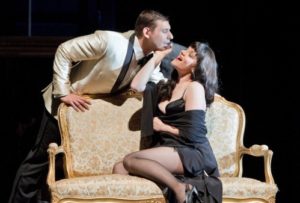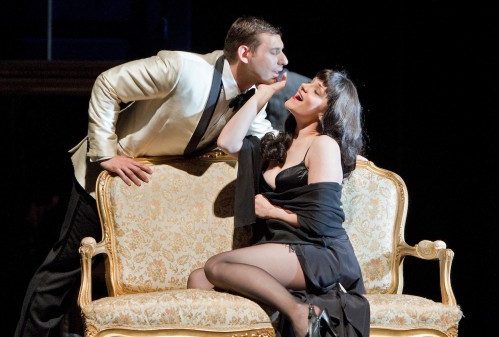22 February 2018
Telling It As It Is
By J R Thomas
 Your correspondent’s first exposure to a work of Will Shakespeare was “Julius Caesar” at a provincial theatre. Caesar appeared as a Mussolini lookalike, all fascistic salutes and tightly tailored trouserings, with sneering acolytes strutting around behind him. We schoolboys got the message; this is a play about power, about the susceptibility of crowds to rhetoric, about however tight-knit your group of co-workers, you can never trust any of them. The next morning, back at school, we looked at the headmaster on stage at morning assembly, and the gowned masters behind him, and wondered whether those loose sleeves contained waiting daggers.
Your correspondent’s first exposure to a work of Will Shakespeare was “Julius Caesar” at a provincial theatre. Caesar appeared as a Mussolini lookalike, all fascistic salutes and tightly tailored trouserings, with sneering acolytes strutting around behind him. We schoolboys got the message; this is a play about power, about the susceptibility of crowds to rhetoric, about however tight-knit your group of co-workers, you can never trust any of them. The next morning, back at school, we looked at the headmaster on stage at morning assembly, and the gowned masters behind him, and wondered whether those loose sleeves contained waiting daggers.
If you want to see a live production of Julius Caesar in London today you will need to make your way to the Bridge Theatre, where a modern dress production is on for a limited run. David Morrissey has offended the critics by being too old to play Mark Antony, though they seem relaxed about a female Cassius and a young bookish Brutus (Michelle Fairley and Ben Whishaw, respectively). In this participatory age the audience not only has to pay for the tickets, it also has to do some of the acting – a large section moves around the stage, playing the so easily influenced Roman crowd. Nothing wrong with any of that; JC is about themes that remain as relevant today as when Bill wrote the play and as when Caesar ignored the warnings of the soothsayer. It positively lends itself to being played in modern dress to underline what it is all about and as to why it is not just history and entertainment, but also a warning.
And if you don’t grasp it entirely, a related production is playing just down the road in the Westminster Palace of Varieties, where skulking conspirators are yet again withholding their weapons; though for how long nobody knows.
But might it not just be fun, just for a change, to see the Roman play in Roman dress? These are, after all, alleged to be actual events. Mr Shakespeare might prudently have had a stage hand hold up a sign at the opening of his production to say “Based On True Events”, but we do know that Caesar was assassinated by those who variously feared his power and longed to exercise it themselves. It would lose nothing in being set in the historical period from which it springs. Something might even be gained in our understanding of not how history repeats itself, but how sometimes and in some ways, it does not.
But the modern director, whether he plies his trade in the opera house or the theatre, seems to have been trained that the one rule that must apply to any production worthy of charging the public fifty quid a ticket is that it must not be set in the period for which it was written. Now, this column does not want to be known for its resemblance to a philistine. Modern productions are often revealing and fascinating; they may even make great literature more accessible to the young audience (though that probably is to grossly underestimate the intelligence of such an audience).
 But it does not always work. Mozart operas are not easy, one would venture to say, to move from a reasonable approximation of their original historical context. Your amateur critic still shudders at the memory of an ENO production of Don Giovanni which opened with the Don, high on illegal (and presumably in the C17th century Veneto, unobtainable) substances, in vigorous congress with his amour in the back of an abandoned motor car on a derelict lot in some decaying American city, surrounded by his gang egging him on. Things only got worse, complete with some adjustments by the director to what he saw as weaknesses in the original work. I can’t tell you how it ended; a bar – any bar – called us away. Mozart was creating an ironically comic opera, but he was also thinking of the misuse of power by men in positions of advantage. That, you might agree, is very much a theme for today, and we look forward to a production (full orchestra and chorus please) set in a major Hollywood producer’s office, but any modern Don Giovanni production has to overcome the whole series of miscommunications and failures of recognition which make the plot work. In the era of twitter and mobile phones the piece would need a rewrite. But set it back in the Veneto and put the chaps in gorgeous pantaloons and the ladies weeping and sighing; we get the point as to what the message is. Maybe we even get more of the point; misuse of power is not a new issue.
But it does not always work. Mozart operas are not easy, one would venture to say, to move from a reasonable approximation of their original historical context. Your amateur critic still shudders at the memory of an ENO production of Don Giovanni which opened with the Don, high on illegal (and presumably in the C17th century Veneto, unobtainable) substances, in vigorous congress with his amour in the back of an abandoned motor car on a derelict lot in some decaying American city, surrounded by his gang egging him on. Things only got worse, complete with some adjustments by the director to what he saw as weaknesses in the original work. I can’t tell you how it ended; a bar – any bar – called us away. Mozart was creating an ironically comic opera, but he was also thinking of the misuse of power by men in positions of advantage. That, you might agree, is very much a theme for today, and we look forward to a production (full orchestra and chorus please) set in a major Hollywood producer’s office, but any modern Don Giovanni production has to overcome the whole series of miscommunications and failures of recognition which make the plot work. In the era of twitter and mobile phones the piece would need a rewrite. But set it back in the Veneto and put the chaps in gorgeous pantaloons and the ladies weeping and sighing; we get the point as to what the message is. Maybe we even get more of the point; misuse of power is not a new issue.
Even Shakespeare does not always adapt that easily. No girl from the Upper West Side was going to hang over a balcony waiting for a gang member to wander by, however gorgeous. But rewrite the eternal theme of Romeo and Juliet into gangland 1950’s New York, rechristen it West Side Story, and we all got the point. Though we also could still do so in an Italian Renaissance cityscape, with aggressive young chaps in tights. It is another story with an eternal core, though jeans versus tights can illuminate different aspects.
Barrie Kosky, hip opera director of our time, is currently having a go at reinterpretation – his victim is Carmen, Bizet’s ode to tobacco and femme fatales. He has reordered things, moved it from Spain, made it into a 1950’s musical, though leaving the tragic heroine to be abused to maintain the key verities of the plot. The critics seem to be puzzled, finding it entertaining but confusing as to what any of it means – or why it is showing at the Royal Opera House.
Thank goodness, for those of us of a traditionalist turn of mind, for celluloid. Film directors seem not to be such relentlessly on-message re-interpreters. How best to portray a weak charming man and a strong ambitious woman? No, not the Clintons; the Macbeths, Thane and Thanesss of Cawdor. In 2015 Justin Kurzel took the Scottish Play back to its medieval Highland roots, in a lavish film production full of mists, moors, and menace. More authentic it would have been difficult to get (aided by a stunning score) but the public seemed to disagree – the critics loved it but the ticket payers failed to turn up. Unlike Kevin Spacey and Robin Wright’s House of Cards, sub Macbethian, sub Clintononian White House, another way of addressing the same theme. Maybe the general public really does prefer eternal messages in the language of today,
Opera is the most demanding of all staged productions, and certainly the most expensive per head of the audience. In these circumstances, and especially given that many operas are heavily subsidised by the state (it is notable that those that aren’t, such as Freddie Stockdale’s Pavilion Opera, and Glyndebourne, are much more circumspect in radical reworkings of historic texts) one might expect some caution in the risk of offending the audience. Yet it is the great national opera houses that seem most particularly to have fallen prey to often catastrophically modern interpretations. It is an art form that has a restricted audience for its productions, but a very rich one, and at the risk of gross over flattery, a highly intelligent one. Coupled with superstar directors of astonishing self-confidence, and lavish budgets, that makes for experimentation. Perhaps we have to agree there is nothing wrong with that, especially if the director will take note when the audience boos and adjusts his approach accordingly. Alas, English audiences are not strong on booing. Perhaps the time has come to learn.


